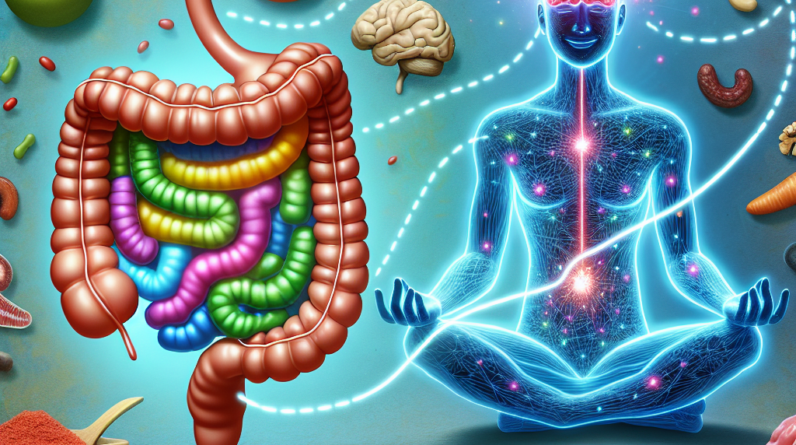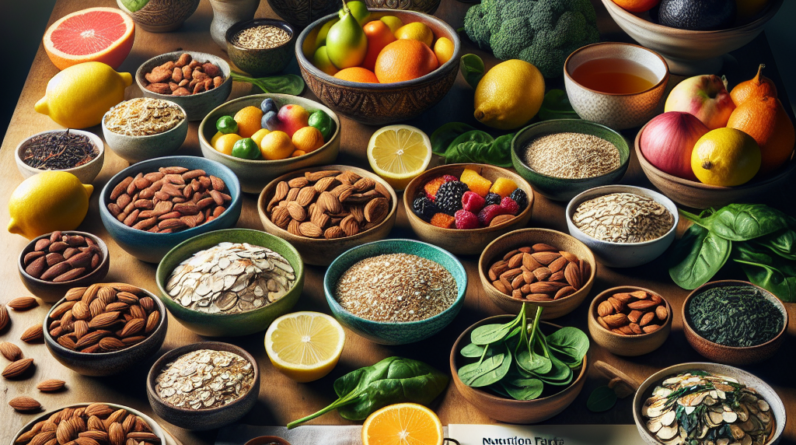
Understanding the Gut-Brain Axis
What is the Gut-Brain Axis?
So, let’s kick things off by diving into something called the gut-brain axis. This fancy term basically refers to the continuous communication between our gut and our brain. Imagine them chatting back and forth like best buddies—what happens in one affects the other. If your stomach is feeling funky, your mind might not be too happy either.
Get a Huge Discount and Bonus! Try for 90 Days Risk Free
This connection happens through various pathways, including the vagus nerve, which sends signals between the gut and the brain. Think of it as a two-way street where both parties are always in tune with one another.
When we eat foods that promote a healthy gut microbiome, we set the stage for our brains to perform at their best. This relationship is so crucial that researchers often say, “A happy gut means a happy mind!”
Gut Health’s Impact on Mood
Alright, let’s get real about how gut health can affect our mood. Ever notice that when your tummy is in knots, your mood tends to follow suit? That’s no coincidence. Studies have shown that imbalances in gut bacteria—those little critters living in our digestive system—can lead to increased anxiety and even depression.
When our gut is happy, it produces neurotransmitters like serotonin, which is often dubbed the “happy hormone.” In fact, about 90% of serotonin is produced in the gut! So, it’s safe to say that taking care of our gut can seriously boost our mood.
Just think about how we often experience “gut feelings.” It’s fascinating how intertwined our emotions can be with our digestive health. If you’re not feeling your best mentally, it might be worth checking in on what your gut is up to!
Diet’s Role in Gut Health
Now, let’s talk about diet because what we shove into our mouths plays a huge role in our gut health. I’ve had my ups and downs with food choices, and I’ve learned that the more whole, unprocessed foods I eat, the better I feel—not just physically, but mentally too.
Foods rich in fiber, probiotics, and omega-3 fatty acids can do wonders for your gut microbiome. Think yogurt, leafy greens, and fatty fish like salmon. Not only do they nourish our guts, but they can also bring about a more optimistic mood and higher energy levels.
Trust me, I’ve had those moments where I fueled my body with junk—think fast food and sugary snacks—and guess what? My mood tanked, often dragging my motivation along with it. Switch to a balanced diet, and you’ll see a noticeable difference!
Get a Huge Discount and Bonus! Try for 90 Days Risk Free
Inflammation and Mental Health
Understanding Inflammation
Let’s break down inflammation because it’s a sneaky player in this entire gut-brain game. Chronic inflammation in the body can influence our mental state. I’m talking about that sluggish, foggy feeling that creeps in when you’ve been eating poorly or stressed out.
Research suggests that inflammation may contribute to mood disorders like anxiety and depression. It’s like a chain reaction: a stressed-out gut can lead to an inflamed body, impacting how we feel daily.
By addressing inflammation through diet, we have the power to sway our emotional well-being. Incorporating anti-inflammatory foods like berries, turmeric, and green tea helps keep inflammation at bay, giving you that mental clarity and happiness we’re all chasing.
Foods to Fight Inflammation
You might be wondering which foods you should include to keep inflammation low. Well, let me share my top picks! First up, berries are a fantastic choice. They’re not just delicious but are jam-packed with antioxidants that fight off inflammation.
Need a Serious Energy BOOST? Huge Discount Try for 90 Days Risk Free
Another superstar? Fatty fish. Seriously, add some salmon or sardines into your meals and start to feel the difference. Even nuts and seeds, like walnuts and chia seeds, are game-changers for both your gut and mind.
It’s all about making small changes that can lead to big rewards. So, next time you’re shopping for groceries, think about grabbing those colorful fruits and veggies along with healthy fats. Your body (and mind) will totally thank you!
The Importance of a Balanced Diet
Striking a balance in your diet is crucial for maintaining gut health and, by extension, supporting your mood. I’ve learned that embracing a variety of nutrients is key to feeling my best. Diversity in food leads to diversity in gut bacteria, which is such a good thing!
Remember, it’s not about strict dieting—it’s about nourishing ourselves. I’ve found that when I focus on a well-balanced plate filled with greens, lean proteins, and healthy carbs, I not only feel more energetic but also emotionally uplifted.
It’s easy to get caught up in trends, but at the end of the day, balance is where the real magic happens for our gut and mind connection. You can totally enjoy your favorite treats in moderation while making healthy choices most days.
Stress Management Techniques
Recognizing the Signs of Stress
Okay, let’s chat about stress because it’s a major culprit in disrupting our gut health and mood. Oftentimes, we don’t even realize we’re stressed until our body screams at us through gut issues. Signs can include bloating, indigestion, or just a constant feeling of being overwhelmed.
I had to learn the hard way that stress affects not just my mind but my gut too! It’s like they feed off of each other, creating this vicious cycle that can be tough to break.
Being mindful of our stress levels is crucial. Whether it’s through journaling, yoga, or just taking a few minutes to breathe deeply, acknowledging our stress is a powerful first step in taking back control.
Incorporating Mindfulness Practices
One of my favorite ways to combat stress is through mindfulness practices. Meditation, deep breathing, or even just taking a walk in nature can work wonders for calming the mind and, in turn, soothing the gut.
Good Health Solution is Easier Than Most People Think!
Take a Look for Yourself!
I’ve found that spending even five minutes a day to meditate or practice mindfulness helps clear the fog and significantly reduces my stress levels. When I’m less stressed, my tummy is a lot happier, and my mood skyrockets.
Try incorporating small moments of mindfulness into your day—trust me, it’s life-changing! You’ll not only notice improvements in your stress levels but also feel that delightful lift in your mood.
Exercise and its Benefits
Let’s not forget about good ol’ exercise. Seriously, moving our bodies is one of the best things we can do for our mental and gut health. I’ve experienced such a mood boost after a good workout, whether it’s a walk, yoga session, or hitting the gym.
Exercise helps reduce stress, increases endorphins, and supports digestion—all contributing to an overall happier gut and brain connection. Plus, it doesn’t always have to be intense; even some gentle stretching can make a huge difference.
Set small, realistic goals for incorporating physical activity into your routine. Maybe dance around the living room or take your dog for a longer walk. The key is to find something you love, and the benefits will follow!
The Role of Probiotics in Mood Enhancement
What are Probiotics?
Alright, so now let’s chat about probiotics. These little guys are live bacteria that can seriously improve gut health when consumed in adequate amounts. Think of them as the cheerleaders for your digestive system!
I started taking probiotics after learning about their benefits, and wow, what a difference they made. They help balance the gut microbiome, which is essential for optimal health and, you guessed it, mood enhancement.
Whether it’s through supplements or foods like yogurt, kefir, or fermented veggies, incorporating probiotics can be a game changer for your gut. It’s like giving your stomach an instant boost!
Benefits of Probiotics for Mental Health
Not only do probiotics promote a healthier gut, but studies have shown they can also have a positive impact on mental health. I mean, who wouldn’t want a little extra happiness sprinkled in their day?
Research indicates that people who consume probiotics may experience lower levels of anxiety and depression. It’s encouraging to know that a simple addition to our diets can support emotional well-being.
Don’t just take my word for it! Try integrating more probiotic-rich foods into your meals. You might be surprised by the mental lift you experience over time.
How to Incorporate Probiotics into Your Diet
If you’re wondering how to add probiotics to your diet, it’s super easy! Just start with foods like yogurt, kimchi, kombucha, and miso soup. These foods are delicious, and you can find them in most grocery stores.
I’ve made it a habit to snack on yogurt topped with fruit and nuts as a tasty and healthy boost. Plus, it’s a fun way to experiment with different flavors!
Remember that consistency is key. Make probiotics a regular part of your diet, and you’ll likely notice improvements in your gut health and mood. It’s all about creating habits that nourish your whole being!
Conclusion
As you can see, the connection between gut health and mood is incredibly profound. By taking care of our gut through a balanced diet, stress management, and the incorporation of probiotics, we can create a positive feedback loop that enhances both our physical and mental well-being.
Learning about this relationship has genuinely changed how I approach my health. It’s all about listening to our bodies and being proactive in our choices. I hope you feel empowered to explore these connections further in your own life!
FAQs
1. How is gut health connected to mood?
Gut health affects mood through the gut-brain axis, where gut bacteria communicate with the brain, influencing emotions and mental health.
2. Can diet really impact my mood?
Absolutely! Eating a balanced diet rich in fiber, probiotics, and anti-inflammatory foods can significantly enhance your mood and overall emotional well-being.
3. What role do probiotics play in gut health?
Probiotics are beneficial bacteria that help balance the gut microbiome, which can improve digestion and positively affect mental health.
4. How can I reduce stress to improve my gut health?
Incorporating mindfulness practices, regular exercise, and simple relaxation techniques can help significantly lower stress levels and benefit gut health.
5. Are there specific foods I should prioritize for gut health?
Yes! Focus on foods rich in fiber, probiotics, and omega-3 fatty acids, such as whole grains, yogurt, fatty fish, fruits, and vegetables.







